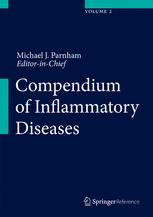
Compendium of Inflammatory Diseases PDF
Preview Compendium of Inflammatory Diseases
P a r n h a m E d . Michael J. Parnham Editor-in-Chief Compendium 1 of Inflammatory IC n o fl . m Diseases a | mp – e m H n d a ti ou rm y Do f THIS VOLUME IS ONLY SOLD i s AS PART OF A SET e Biomedicine a ISBN 978-3-7643-8530-9 s 01 e s 9 783764 385309 Compendium of Inflammatory Diseases Michael J. Parnham Editor-in-Chief Compendium of Inflammatory Diseases With218Figuresand116Tables Editor-in-Chief MichaelJ.Parnham FraunhoferIME-TMP& JWGoetheUniversityFrankfurt FrankfurtamMain,Germany ISBN978-3-7643-8530-9 ISBN978-3-7643-8550-7(eBook) ISBN978-3-7643-8677-1(printandelectronicbundle) DOI10.1007/978-3-7643-8550-7 LibraryofCongressControlNumber:2016946035 #SpringerBasel2016 Thisworkissubjecttocopyright.AllrightsarereservedbythePublisher,whetherthewholeor part of the material is concerned, specifically the rights of translation, reprinting, reuse of illustrations,recitation,broadcasting,reproductiononmicrofilmsorinanyotherphysicalway, andtransmissionorinformationstorageandretrieval,electronicadaptation,computersoftware,or bysimilarordissimilarmethodologynowknownorhereafterdeveloped. Theuseofgeneraldescriptivenames,registerednames,trademarks,servicemarks,etc.inthis publicationdoesnotimply,evenintheabsenceofaspecificstatement,thatsuchnamesareexempt fromtherelevantprotectivelawsandregulationsandthereforefreeforgeneraluse. Thepublisher,theauthorsandtheeditorsaresafetoassumethattheadviceandinformationinthis bookarebelievedtobetrueandaccurateatthedateofpublication.Neitherthepublishernorthe authorsortheeditorsgiveawarranty,expressorimplied,withrespecttothematerialcontained hereinorforanyerrorsoromissionsthatmayhavebeenmade. Printedonacid-freepaper ThisbookispublishedunderthetradenameBirkhäuser,www.birkhauser-science.com TheregisteredcompanyisSpringerInternationalPublishingAG,CH TheregisteredcompanyaddressisPicassoplatz4,4052Basel,Switzerland Preface Inflammation has become one of the most exciting and rewarding areas of medicalresearch.Recentyearshaveseenarevolutioninourunderstandingof how blood and tissue cells interact and of the intracellular mechanisms con- trollingtheiractivation.Thishasrevealedtheunderlyinginflammatorypathol- ogyofawidevarietyofdiseasesandprovidedmultiplenewtargetsfordrug therapy.Asaconsequence,therehasbeenaburstinthedevelopmentofnew anti-inflammatoryandimmunomodulatorydrugsforthesediseases.Inparal- lel, the literature on inflammatory diseases, the mechanisms and mediators involved,andapproachestodrugtherapyhasexpandeddramaticallysothatit isverydifficulttoobtainanoverviewofthefield. The Compendium of Inflammatory Diseases is an attempt to rectify this situation, providing in-depth information for students, teachers, researchers, andcliniciansworkinginacademia,hospital,andindustry.Thereferencework provides insight into the cellular and humoral components and processes of inflammation,itstreatment,anditsclinicalexpressioninacollectionofarticles eachwrittenbyexpertsintheirfields.ThesimpleA–Zformatprovideseasy accesstorelevantinformation.Thecompendiumisbeingpublishedsimulta- neouslyinprintandelectronicforms.Extensivecrossreferencestoentriesin thecompendiumandinotherSpringerReference worksenableefficient and user-friendlysearches. Becauseoftheconstantchangeinourunderstandingofinflammation,the printversionprovidesaselectiveviewofthecurrentstatus,andinsuchalarge referenceworkomissionsareinevitable.However,asignificantaspectofthe formatisthatalivingreferenceordynamiconlineversionisavailable,which can be updated by authors and editors to keep up with new developments. Since new authors can also submit contributions to the online edition, this version will continue to grow. The DOI for the living reference (currently, Encyclopedia of Inflammatory Diseases) is http://link.springer. com/referencework/10.1007/978-3-0348-0620-6. As a living project, the compendium will serve as a reliable data pool for all those working in inflammation research, becoming an indispensible source of information for academia,clinicalpractitioners,andindustry. Work on the compendium was started in 2004 and has involved a large numberofpeopleovertheyears.Ithank,inparticular,theassociateeditorsof the various parts of the compendium: Anne-Marie Irani, Jason McDougall, and Marc Feldmann for inflammatory diseases; Sylvie Chollet-Martin for v vi Preface inflammatory cells and processes; Heiko M€uhl and Heinfried Radeke for inflammatory mediators; and Garry Graham and Kevin Pile for the pharma- cologyofinflammation.Thanksforyourpatience,dedication,andhardwork. I also acknowledge the assistance of John Hamilton, Alan Lewis, Luke O’Neill, and Peter Lipsky who originally helped to put a list of potential articlestogetherandVincentLagenteandValerieQuesniauxwhogavesupport alongtheway.Iamalsoextremelygratefultoalltheauthorswhogavetheir time and energy to the writing of the approximately 120 chapters. A special word of thanks to the people at Springer who encouraged, cajoled, and supported the collation and processing of the manuscripts: Detlef Kl€uber who initiated and promoted the project together with Sandra Fabiani and Susanne Friedrichsen; Lydia M€uller, Kerstin Kindler, and Somodatta Roy whodidthehands-onprocessingworkintheearlyphasesoftheproject;and SunaliMullandKeerthiSudevanwhopulledthestringstogethertobringthe projecttoitsfirstprintmilestone. FrankfurtamMain MichaelJ.Parnham April2016 About the Editor-in-Chief MichaelJ.ParnhamB.Sc.,Ph.D.,CBiolMSB,FBPhSFraunhoferInstitute forMolecularBiologyandAppliedEcologyIME,ProjectGroupTranslational Medicine and Pharmacology TMP and JW Goethe University Frankfurt, FrankfurtamMain,Germany Michael Parnham studied Pharmacology at Chelsea (now King’s) College, London, including a year working on prostaglandins and pain with Sergio FerreiraatTheRoyalCollegeofSurgeonsandcompleteddoctoralstudiesat Bristol University in 1973. Postdoctoral research took him to Erasmus Uni- versityRotterdam,TheNetherlands,toworkwithIvanBontaonprostaglan- dinsandchronicinflammation.ThisledtotheawardoftheGoslingsPrizefor research on antirheumatic therapy and the cofounding with Bonta and Kay BruneoftheEuropeanWorkshoponInflammation,ofwhichDr.Parnhamwas secretaryformanyyears.In1980,hemovedtoGermanyforadecadeinanti- inflammatory research with A. Nattermann/Rhône-Poulenc, becoming Head of General Biology. In 1990, he and his colleagues were awarded the Prix Galien Germany for the development of ebselen, a novel organoselenium approach to anti-inflammatory therapy. In the same year, Dr. Parnham establishedaconsultancyandbecamealecturerinpharmacologyandtoxicol- ogyatGoetheUniversity,Frankfurt.AppointedProfessorinFrankfurtin1998, Dr.ParnhamalsomovedtoZagreb,Croatia,whereheestablishednewphar- macologyandtoxicologylabsintheResearchInstituteofPLIVAPharmaceu- ticals. He and his team characterized the immunomodulatory effects of macrolide antibiotics and developed two new chemical agents and two biogenericstoclinicaltrials,receivingtwoawardsfromPLIVA.Subsequently, vii viii AbouttheEditor-in-Chief afterownershipchangedin2006,hewasDirectorofPreclinicalDiscoveryat GlaxoSmithKline in Zagreb. Currently, he is Head of Preclinical Research atFraunhoferIME-TMPinFrankfurt,Germany,carryingoutappliedresearch in neuroinflammation, autoimmunity, sepsis, and pain. He is editor of the monograph series Progress in Inflammation Research and coeditor of Mile- stones in Drug Therapy and of the textbook Principles of Immunophar- macology. From 1982 to 2013, Prof. Parnham was Editor, then Managing Editor of the peer-reviewed journal Inflammation Research. In 2015, he received the Lifetime Achievement Award of the International Association ofInflammationSocieties. Section Editors Section:InflammatoryDiseases Anne-MarieIrani DivisionofAllergyandImmunology,Children’sHospital of Richmond at VCU, Virginia Commonwealth University, Richmond, VA, USA Sir Marc Feldmann Emeritus Professor, Kennedy Institute of Rheumatol- ogy,NDORMS,UniversityofOxford,BotnarResearchCentre,Headington, Oxford,UK ix
